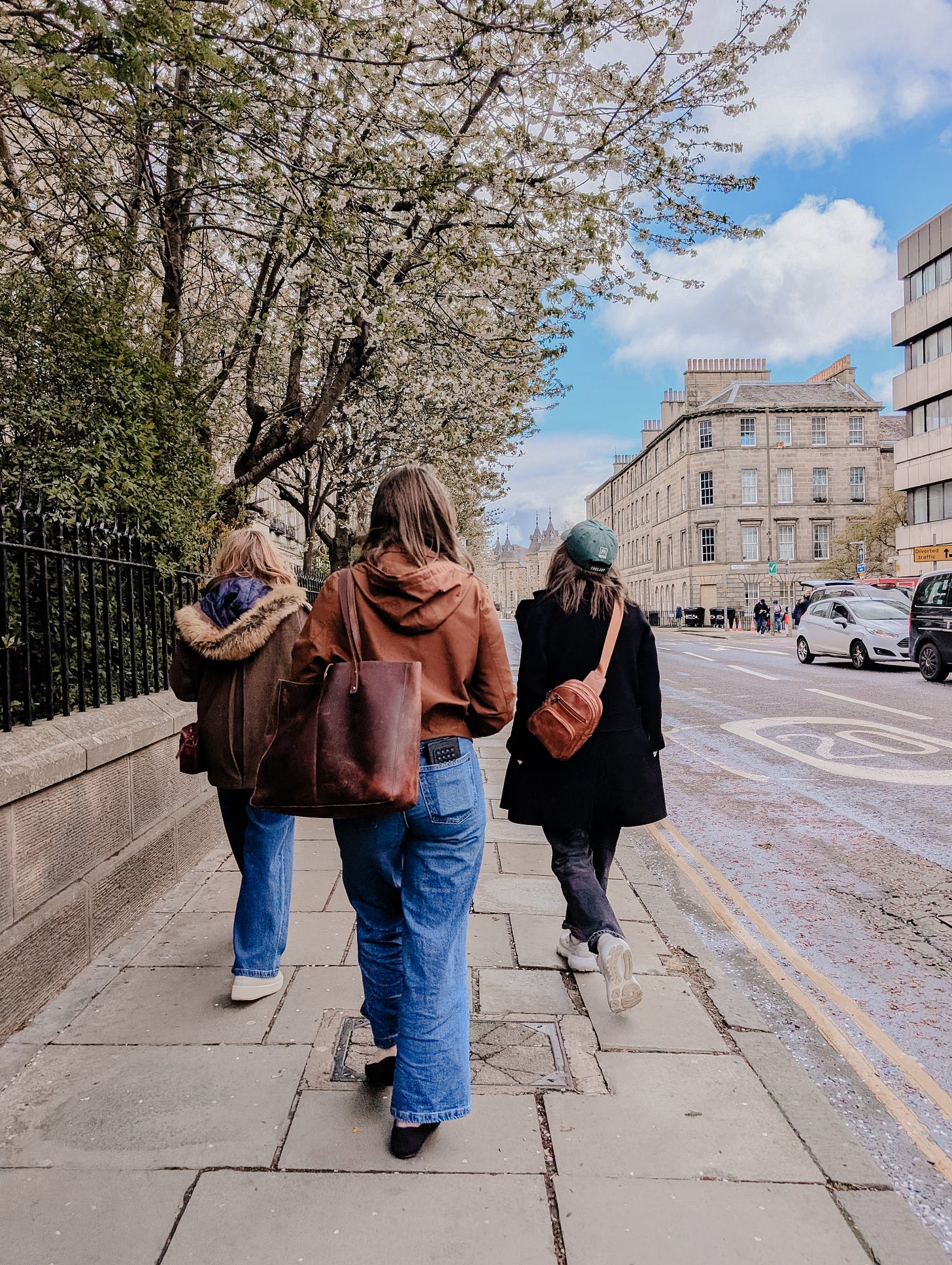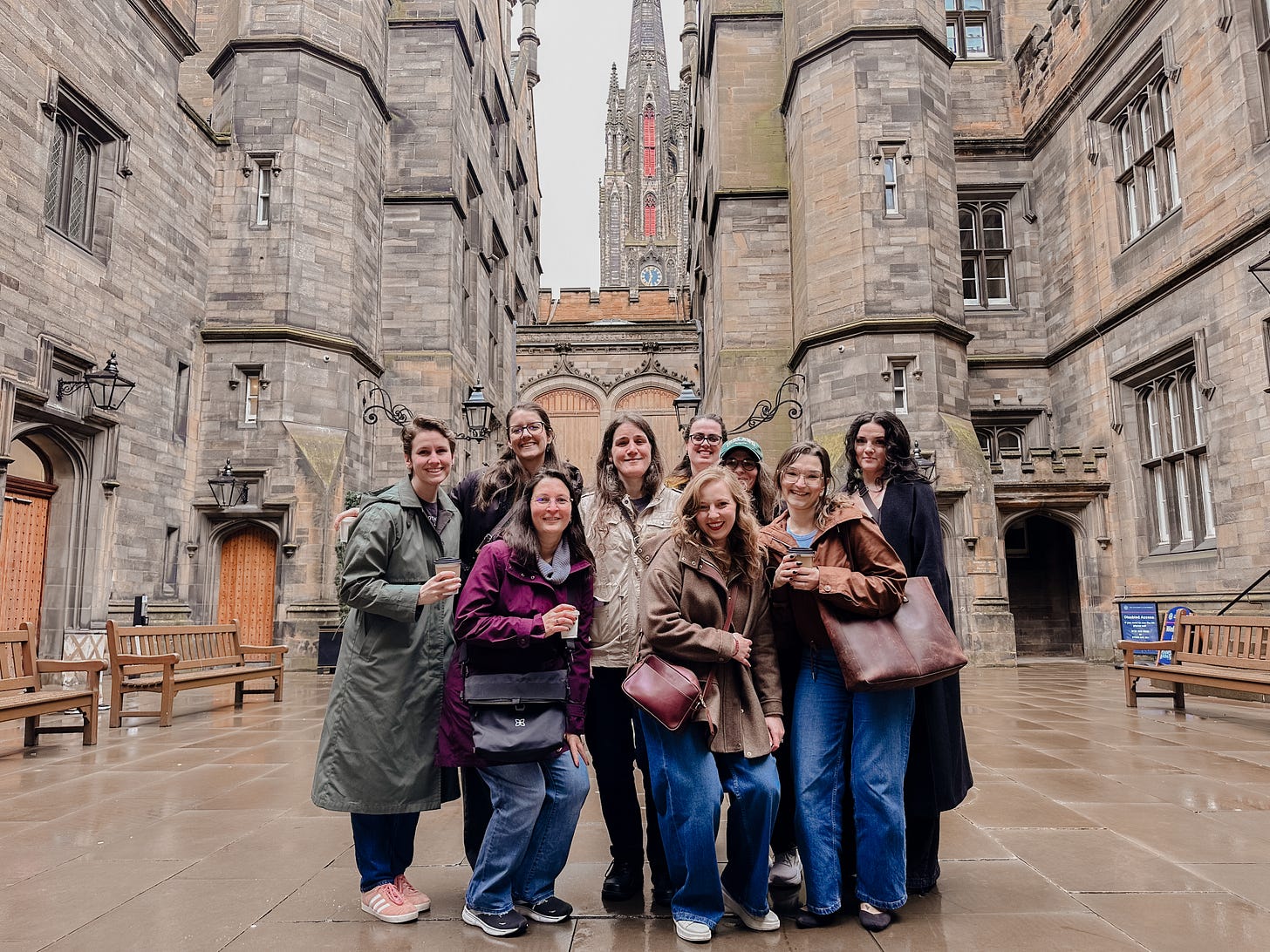They brought my fears with them in their suitcases
Thoughts from the Edinburgh Writing Retreat: Part One
Hey, friends! It’s been a while since I’ve published (I’m sorryyyy!) And we’re jumping straight in with an essay about where the heck I’ve been for the last month. But at the end, I’m giving a breakdown of same minor pivots that I’m making here at The Battle Cry, so if you’re interested in that, feel free to scroll down to the bottom. (P.S. I’m so glad you’re here!)
“I can go!!!!” my best friend, Dusty, texted me from America at 11 o’clock at night, and my heart skipped a beat.
Wait, really? Can we really do this? Does life REALLY get to be this wonderful, if only for a moment?
Within 20 minutes, we’d both booked the remaining two tickets to Kristen LaValley’s writing retreat in Edinburgh, and I lay awake until 2am, energy buzzing as I made a list of all the places I wanted to take my friend.
But I was unable to shake the feeling that the other shoe was about to drop. Surely something must be coming to derail my joy. There was just no way that I’d get to show one of my dearest friends around one of my favourite cities for the sole purpose of having fun and writing under the tutorship of one of our favourite authors.
For a moment, I was 12-years-old again, caged in my bedroom of metallic pink and gold, staring out the window at the dry field of weeds that made up my penitentiary. That little girl yearned for nothing more than the reality that was waiting for me in April – and yet it still didn’t feel real. It felt like a dream in the most literal sense. I was sure that I was going to wake up soon.
What I didn’t realise was just how badly 12-year-old Christina would fight to join me on the trip.
As soon as I checked the calendar to confirm the dates of the retreat (an afterthought once I’d booked), I realised that it landed right in the middle of Holy Week, with our last full day culminating on Easter Sunday. Immediately, every cell in my body woke up: “You must go to church” they sang.
Weird. Easter is my favourite holiday, but I’ve never been dogmatic about requiring a church building in order to worship my God. Yet there was no mistaking it: the need to be in fellowship with other worshippers, singing the liturgies in honour of the risen Christ, was as palpable as thirst.
I didn’t want to conflict with Kristen’s schedule or disrupt the flow of the week, but I couldn’t deny the thirst. I didn’t want to deny the thirst.
As we all got to know each other better on WhatsApp, I carefully broached the subject, so aware of every anxiety in my body coming to attention from the last time 12-year-old Christina engaged in such a large group of predominantly American women – well, girls at the time, but still. (Spoiler alert: it did not end well for 12-year-old Christina).
The old voices returned: “Judgemental. Ignorant. Too loud. Not enough. Prudish. Obnoxious. Bossy.”
So many fears raced through my head, aware as I was that Kristen attracts a beautifully diverse audience of people in various stages of belief. Would I sound prudish and legalistic for wanting to attend church amidst a group of women who have likely experienced church abuse? Would I seem rude or presumptive for disrupting Kristen’s itinerary? Despite my confidence that the Spirit was gently asking me to seek Him in liturgy on Easter Sunday, my old insecurities screamed louder, bidding me to yield.
When I made the suggestion, I spoke only for myself, hoping to find a middle ground in the tension of who I am and who I want to be.
It’s incredible how blind we become in our fear.
Had I been able to quiet all the voices in my head, I’d have been entirely unsurprised by the gentleness with which my suggestion was met. A testament to Kristen and who she is, not only do the people who follow her come from diverse backgrounds but they actually approach the differences in others with kindness, assuming the best rather than the worst in the first instance.
It’s equally incredible how free one feels to embrace their identity in Christ when the Body of Christ actually allows us to breathe.
Before I knew it, I was met with the task of coordinating and confirming the service times for an entire group of women who wanted to sit alongside me on Easter Sunday.
But 12-year-old Christina’s voice didn’t ease. She only got louder.
I don’t know what I was expecting when I arrived at the flat in New Town, drenched in rain, Dusty trailing behind me with the heaviest of the suitcases to spare my chronically inflamed spine.
What I do know is that I probably wouldn’t have gone at all had Dusty not been by my side. When I left America, I also left behind a world in which most women of that culture (Dusty is obviously an exception) frequently misunderstood my intentions, became exasperated by my loudness, and eventually shunned me.1 I spent nearly two years in and out of eating lunch entirely alone in high school, and I don’t think I realised how formative that isolation was for me because it was swallowed up in the wake of greater traumas.
My world of friendships only opened up when I moved to England, and the Atlantic Ocean acted like a safety net, keeping the “old me” in her place as the people on this beautiful little island welcomed a “new me” – not a reinvented self but merely a version of me that was untainted by childhood first impressions.
While these women in Edinburgh didn’t know childhood Christina either, they unknowingly brought “her” with them in their luggage as they crossed the Atlantic. By virtue of being the largest group of American women I’ve spent time with since high school, their very presence in “new me’s” country represented a tearing of my safety net. There was nowhere to hide; and where “new me” had grown into a writer, a teacher, a confident woman with a voice, “old me” – afraid of that same voice for the loneliness it brought down on my head – didn’t want to be seen.
To be seen was to be misunderstood. To be misunderstood was to be dismissed. To be dismissed was to be silenced – my voice and my heart along with it.
The first few hours were easy. Some of the women brought me packs of Nutter Butters (one of my favourite childhood snacks), and I chatted comfortably about the pitfalls of expatriating and feeling like you belong to two countries.
But as the sun went down and we settled into our spots on the couch, Kristen invited that first holy moment in which each woman would have the opportunity to share a piece of their story. Only then did my heart start racing.
Writing is easy. Teaching is easy. But speaking to be seen? By strangers? No longer able to hide behind the quirky persona of the American-turned-British girl? I wanted to cry and run out of the room, the wordiest verbal processor to ever fear opening her mouth.
But my heart slowed as I admired and absorbed the bravery of the women who opened their mouths before me. Their vulnerability softened mine. Their stories were like houses with rooms that felt familiar to me. Perhaps the safety net could drop, and 12-year-old Christina could learn a thing or two about what it looks like to be imperfect and beautiful and still belong to the Body of Christ.
I don’t remember everything I shared that night – only that the words tumbled out of me as my hands shook, and my story wasn’t polished, and my head still told me I was a fraud; but the women who stared back at me did not turn away. They did not mock. They did not misunderstand. They just sat alongside me in compassion, each one of us giving the other permission to breathe.
Our stories collided into an abstract painting, coloured by trauma and redemption, by different political and religious views, by varying neurological and physical struggles, but the canvas which held it all together was that of a single expectation: compassion.
And incredibly, each one of us, despite our different backgrounds, fell into the rest of compassion like a child falls into their mother’s arms after a long day. It felt both familiar and unfamiliar. But most of all, it felt safe.
It strikes me, upon reflection, just how deeply compassion reflects the heart of Christ – how he lead with compassion as he healed the sick in his earthly ministry. Compassion pre-empts redemption.
I have experienced this deep compassion in moments of quiet with Him: revelations from Scripture, divine conversations in prayer, epiphanies of Jesus revealing his nature to me; I have not, however, experienced much of it in traditional church settings. That’s not to say I’ve never experienced it – only that it’s been rare.
There aren’t many spaces where compassion is the single most foundational aspect to a Christian gathering. Perhaps it’s implied, but only in a box-ticking, indirect sense. And in our imperfect representations of Christ to one another, we often fail to hold compassion in its rightful place, in equal value alongside truth, discernment, discipleship, and sanctification.
I came to realise that each one of us in this group had been silenced at some point in our lives, whether by parents or church leaders or something else. Many of us, too, had been silenced merely by virtue of being women. And yet I am convinced that this silencing bred within each one of us a holy respect for honouring each other’s voices, for listening without judgment, for existing in juxtaposition with one another and calling it holy. Our sufferings bore our compassion.
The strangers before me lead by example, and their bravery and kindness are the only thing which emboldened me to speak. The act of speaking in itself felt like exposing the raw parts of me which have existed only in the shadows. But the eyes which looked back at me spoke truth in ways that words could not: perhaps the shadows could one day experience the healing light of day.
Maybe we will always fail to represent both perfect love and perfect truth the way Jesus did. But I don’t think the Holy Spirit will ever fail to reveal truth on our behalf when we make space for love to lead the way.
That famous 1 Corinthians 13 verse has been cemented in the context of wedding days, but its final line is less prudent on the shining hill of the marriage altar than it is in the muddy pits of war:
And now these three remain: faith, hope and love. But the greatest of these is love.
1 Corinthians 13:13
As the week unfolded before me, that first night, lead by the compassion of Christ’s love at work in a group of strangers, remained. It was the thread that bound us all together. It was our very own battle cry of war. War against childhood trauma, church abuse, deconstruction, marital anguish, physical and mental infirmities, even death. We explored faith. We explored hope. But the greatest exploration we plumbed was the anatomy of love.
On the floor of a brightly coloured Edinburgh flat strewn in Cadbury’s Mini Eggs and Nutter Butters, we found our first patch of holy ground.
Stay tuned for Part Two.
All my love,
Upcoming changes to my work and your reading experience
As my business has grown this year, I’ve been finding myself stretched thin (like butter spread over too much bread, as Bilbo Baggins puts it). Each branch of my work feels equally important and life-giving, and I’m unwilling to compromise on the quality of the work that I produce for you here on The Battle Cry, Magic Like This, or my Pick Up Your Sword writing course. I spent weeks brainstorming where I can reasonably make changes, and I’ve finally landed on a content schedule which feels both manageable and in keeping with my core priority of providing you with quality, honest, and encouraging content as you seek Christ in your curiosity and creativity.
Changes on Substack
Firstly, my essays here on The Battle Cry will reduce from weekly to every-other-week. On the weeks in between, I will be publishing a Magic Like This episode (that’s my C.S. Lewis podcast, in case you were wondering), and I will crosspost that episode onto the The Battle Cry. For so long, I resisted allowing this “cross-over” to happen, but the more I do this work, the more I realise that the core mission of Magic Like This is in perfect alignment with The Battle Cry, and I truly believe that the content from both Substacks will be both relevant and encouraging to you, my dear readers. Any additional Battle Cry essays that I publish outside of my bi-monthly writing schedule will be behind the paywall for paid subscribers only.
Finally, episodes of my private podcast, The Waffler, will be released once a month, with bonus episodes published as and when I have the space to do so. The Waffler is a paywalled podcast where I go deeper into what God is teaching me at the moment, chat all things creative writing, and share random behind-the-scenes stories from my life. This is a more intimate space where I share things that I don’t feel comfortable sharing to a wider, public audience, but often the things that I share in The Waffler offer greater context to my public essays, so it is a real “reader bonus” for those who regularly engage with my content.
If you want to become a paid subscriber to The Battle Cry, you can join here for £8 a month, and you’ll get access to The Waffler, all paywalled essays, AND a year’s comped subscription to Magic Like This, where you can listen to the 1-hour, extended versions of each episode as opposed to the free, 30-minute version that’s available to the general public. Equally, if you are only interested in a Magic Like This subscription, you can join the Book Club for only £5 a month by clicking here.
It’s also worth mentioning that all paid subscriptions will be going into my Oxford University fund, so your financial support of my work will literally be funding my ability to study Scripture and better provide you with sound doctrine in the work that I do for you here on Substack.
The next writing course launch
I’ll be re-launching my writing course, Pick Up Your Sword, again at the end of this month. This course is a 4-Module curriculum for aspiring Christian authors who want to write a book informed by their own life story, but they don’t know where to start in terms of organising their ideas, clarifying their message, identifying their readership, and developing a book outline. So far, my first round of students have had some beautiful breakthroughs in their own writing, and they’ve found the course to be an extremely helpful companion, prompting them to seek the Lord’s guidance as they implement practical steps to move forward in the writing which God has called them to. If you’re interested in getting the early bird discount when the course launches again at the end of May, make sure to join the waitlist below.
Let me just be clear here: I was a child, and I 100% lacked tact. At 31, I am still learning how to use the “gift” of my voice with discernment. But as a kid? I missed social queues, dominated people in my conversations, and almost certainly exasperated every one of my teachers. People’s irritations were warranted. Their cruelty, however, was not.










Beautiful! The compassion of Christ was part of the message at church today.
Sounds like an amazing experience! I enjoyed reading about it and look forward to hearing more :)